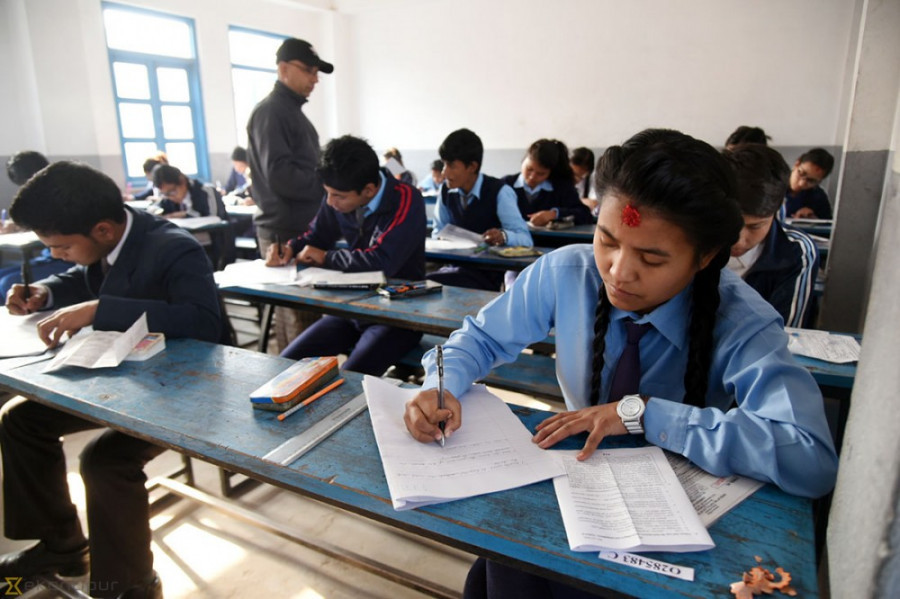National
Letting provinces hold grade 10 exams is just delegation of administrative task, experts say
Until provincial governments are allowed to prepare their own curricula, there’s no devolution of power as per a federal dispensation, they say.
Binod Ghimire
Four years after the eighth amendment to the Education Act decentralised the conduct of the Secondary Education Examination taken at the end of grade 10, the federal government has finally decided to implement the legal provision.
A meeting of the Social Committee of the Cabinet agreed to allow the seven provinces to hold the examination starting this academic year.
“Yes, the committee has concluded that provincial governments should be allowed to hold the Secondary Education Examination,” Krishna Gopal Shrestha, Minister for Education, Science and Technology, told the Post. “However, it needs the Cabinet’s approval before it comes into an effect.”
The Cabinet last week, following a request from the National Examinations Board, had asked its Social Committee to decide over the modality of the examination, the authority to hold it and the date to hold it.
Headed by the home minister, the committee has the education minister, law minister and women and children minister as members.
Given the Covid-19 pandemic, the Secondary Education Examination (SEE) will be held in June, rather than at the end of March during normal times, this academic year.
The board had asked the government in November to make the decision on decentralising the examination since the time had come for registration of students but the government had been delaying the decision.
Nawal Kishor Sah, the minister for social development of Province 2, although he was not aware of the decision, as it has not been approved by the federal Cabinet, welcomed it.
“We have been demanding authority for a long time,” he told the Post.
The provincial examinations boards will be headed by the secretaries at the provincial social development ministries and the provincial education directors will act as the controller of the boards, according to the decision of the Cabinet’s Social Committee.
According to Junga Bahadur Aryal, spokesperson at the National Examinations Board, it will assist the provinces if necessary.
According to Minister Shrestha, the details on different aspects of provinces conducting the examination still need to be worked out.
The provinces will now have to prepare rosters of experts to make question papers and also grade answers, fix dates for the examination and publish the results.
“If we get the responsibility it will be upon us to conduct the tests of a set standard,” said Sah. “We won't compromise on the future of our children.”
The process for conducting the Secondary Education Examination usually starts in August with the registration of the students and concludes in August next year with the publication of results. But it was delayed this year owing to the Covid-19 pandemic, and as a result, the registration began in November.
According to the National Examinations Board, it can pass on the details of the registration of students if a decision on the matter is made.
Once the Cabinet makes the decision, the local governments will be responsible for conducting the examination.
The National Examinations Board will, therefore, manage only grade 12 examinations.
Although the provinces have been given some authority with this decision, education experts say that this is just an administration delegation of authority and not devolution of power as per a federal dispensation.
“Allowing to conduct the tests is just a decentralisation of administrative work,” Binay Kusiyait, a professor at Tribhuvan University, told the Post. “The federal government should authorise the provinces to design their curriculum and give them the entire responsibility of the education to them.”
The Social Committee has also decided that the Secondary Education Examination will be held in June because, according to a senior official of the education ministry, the teaching-learning process was hampered due to the Covid-19 pandemic and the virtual learning facility wasn’t effective and uniform across the nation.
The decision to hold the examinations in June will affect the academic calendar of schools.
“Conducting the Secondary Education Examination in June means, the entire school calendar will be pushed by a couple of months,” said a senior official at the ministry on the condition of anonymity as the decision is yet to be formalised.
With plans to wrap up the ongoing academic session by March-April, the Curriculum Development Centre in September reduced the school curricula load by 30 percent and this is still in force despite the academic year will now end in June.
This means that the academic year 2021-22 will also be curtailed by two months in order to have the academic year end in March-April, the official said.
Last year the government cancelled the Secondary Education Examination as there was no prospect of conducting it owing to the pandemic and the National Examinations Board issued the certificates based on the internal evaluations by the respective schools.
The government has ruled out internal evaluations in the current because of large scale anomaly in the results.




 13.12°C Kathmandu
13.12°C Kathmandu














